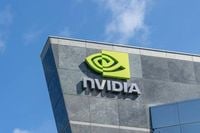On April 16, 2025, the ongoing tensions between the United States and China over technology exports reached a new peak, significantly impacting American technology stocks, particularly Nvidia. The U.S. government has imposed strict restrictions on the export of artificial intelligence chips, specifically the ITSH20 model, to China, a move that has rattled investors and led to a notable decline in Nvidia's stock.
Nvidia, a leading manufacturer of AI chips, announced that it would incur costs amounting to $5.5 billion due to these export restrictions. These measures are part of broader U.S. efforts to limit China's technological advancements, particularly in the rapidly evolving field of artificial intelligence. The restrictions now extend beyond just the ITSH20 chips to include high-performance memory chips and other products manufactured outside the U.S. using American technology, further tightening the noose around China's tech ambitions.
During trading on the same day, Nvidia's shares fell by 6.35%, closing at $105.15. This drop was a significant part of a broader retreat among major American technology stocks, which saw the Roundhill Magnificent Seven fund, tracking top tech companies, decrease by 2.9% to $43.29. Other tech giants also experienced declines, with Apple shares down 2.55% to $196.94, Microsoft down 2.2% to $377.2, and Tesla down 1.7% to $249.34. These declines contributed to a loss of market capitalization for Apple, which fell below the $3 trillion mark for the first time in recent months, now valued at $2.95 trillion.
The ITSH20 chip is particularly significant as it is one of the most advanced models Nvidia offers in China and plays a crucial role in the company’s strategy to compete in the booming AI industry. Chinese firms, including Tencent, Alibaba, and ByteDance, have ramped up their orders for the ITSH20 chips, responding to the increasing demand for affordable AI models. Despite not being as fast as Nvidia's chips available outside China for training AI models, the ITSH20 is competitive in the inference stage, which is witnessing rapid growth and is expected to become the largest segment in the AI chip market.
Nvidia has stated that the U.S. government notified them on April 9, 2025, that the ITSH20 chip would now require a license for export to China, with these regulations set to remain in effect indefinitely. This restriction is primarily motivated by concerns regarding the potential use of these chips in supercomputers, which could enhance China’s capabilities in AI.
In light of these developments, Nvidia has also announced plans to invest in the construction of AI data centers in the United States, with an estimated budget of up to $500 million over the next four years. This initiative is part of a broader strategy to bolster domestic manufacturing and technology capabilities in response to the ongoing geopolitical tensions. Partnering with firms like Taiwan Semiconductor Manufacturing Company (TSMC), Nvidia aims to enhance its production capacity while adhering to the new regulatory landscape.
As the situation unfolds, analysts are closely monitoring the implications of these export restrictions on Nvidia and the broader tech sector. The significant financial impact on Nvidia, coupled with the stock market's reaction, underscores the delicate balance of power in the tech industry and the potential consequences of international trade policies.
In summary, the U.S. government's restrictions on AI chip exports to China have not only put Nvidia in a challenging position financially but have also contributed to a broader downturn in the technology sector. Investors and industry leaders are left to ponder the long-term effects of these measures as they navigate an increasingly complex global landscape.



